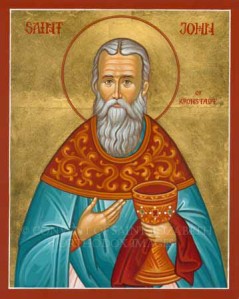 It cannot go without saying that the apostle John’s lasting influence for the development of Christianity was utterly significant, despite his seemingly minor role depicted within the Gospel narratives. In this nineteenth post of my recap/review of James Dunn’s newest volume Neither Jew nor Greek I will sketch out the argument which depicts what many feel is the most controversial christology in the New Testament Gospels and how it affected the developing Jesus traditions within the second century CE (sections 49.1-3). Indeed, Dunn admits that the role of ‘John’ proved to be one of the most powerful influences in the making of Christianity, particularly when compared to James, Paul, and Peter.
It cannot go without saying that the apostle John’s lasting influence for the development of Christianity was utterly significant, despite his seemingly minor role depicted within the Gospel narratives. In this nineteenth post of my recap/review of James Dunn’s newest volume Neither Jew nor Greek I will sketch out the argument which depicts what many feel is the most controversial christology in the New Testament Gospels and how it affected the developing Jesus traditions within the second century CE (sections 49.1-3). Indeed, Dunn admits that the role of ‘John’ proved to be one of the most powerful influences in the making of Christianity, particularly when compared to James, Paul, and Peter.
The discussion begins by noting that the Gospel of John can surely be traced back to Jesus’ mission, notably to eyewitness and ear-witness testimony. John was able to draw upon personal knowledge of such features as the initial mission of John the Baptist, the early recruitment of the Baptist’s disciples, and the Judaean mission. These are traditions which possess a high degree of historicity which the Synoptics evangelists, who understandably wanted to mark the distinction between the Baptist and Jesus rather than the overlap, chose not to employ. For Dunn, the Gospel of John utilizes traditions which were authentic rather than legendary in character.
 The ‘Jewishness’ of John is subsequently argued at length. Dunn notes that the claim in John 20:31, “that Jesus is the Messiah, the Son of God,” is central to the claim of John’s Gospel. Jesus’ messiahship was rooted in the Jewish expectation of the messiah and built upon distinctive Jewish themes. The title ‘Son of God’ culminated from the typical commissioning of a prophet and the ‘Son of Man’ was reminiscent of Jewish reflections of the human figure in Dan. 7:13-14. Furthermore, the portrayal of Jesus in terms of Wisdom and Word was used with language which would resonate meaningfully and favorably in Jewish ears. On this point Dunn cites John Ashton who observes that Jesus’ claims “are made from within the Jewish tradition and cannot be explained in any other way.” All of these points indicate that there exists within the Gospel of John a sustained strategy to present Jesus as the one who fulfilled Israel’s hopes which surpassed the alternatives like Moses, the Torah, and the prophet.
The ‘Jewishness’ of John is subsequently argued at length. Dunn notes that the claim in John 20:31, “that Jesus is the Messiah, the Son of God,” is central to the claim of John’s Gospel. Jesus’ messiahship was rooted in the Jewish expectation of the messiah and built upon distinctive Jewish themes. The title ‘Son of God’ culminated from the typical commissioning of a prophet and the ‘Son of Man’ was reminiscent of Jewish reflections of the human figure in Dan. 7:13-14. Furthermore, the portrayal of Jesus in terms of Wisdom and Word was used with language which would resonate meaningfully and favorably in Jewish ears. On this point Dunn cites John Ashton who observes that Jesus’ claims “are made from within the Jewish tradition and cannot be explained in any other way.” All of these points indicate that there exists within the Gospel of John a sustained strategy to present Jesus as the one who fulfilled Israel’s hopes which surpassed the alternatives like Moses, the Torah, and the prophet.
Unfortunately, John’s evangelistic strategy was not very successful in winning his fellow Jews. Many of the Jewish authorities in his region had put believers in Jesus out of the synagogues. John had hoped that there would be persons similar to Nicodemus (John 3) and the blind man (John 9) who believed secretly and needed to step out in faith and confess their belief. Dunn rightly points out that the dispute between John’s use of Logos theology and Judaism is a dispute, in effect, is still not finally resolved. However, since John was firmly rooted in the Judaism of his time, he “would have denied that he was ignoring or breaching the boundaries which defined Israel’s heritage” (p. 762).
John is to be viewed, in a sense, as a distinctive contributor. The methodological reminder to ‘Let John be John’ is stated from the beginning as a reminder to approach John on his own terms (despite the evidence that it intends to be in continuity with Jewish theology). Four particular subheadings are given: The Incarnate Word, The Son Sent and the Son of Man Descended, The Revealer, and John’s Christology in Gnostic Perspective.
1. The Incarnate Word
Dunn begins this section by declaring that it is not enough to point out the Wisdom and Logos language upon which John drew. What needs to be insisted upon is that the Logos/Wisdom had ‘become flesh.’ In order to drive home his point, Dunn contrasts this assertion from what he regards are less-qualified answers to the significance of John 1:14. For the Logos/Wisdom was not:
- simply manifest in poetic metaphor to describe divine action;
- as symbolized in the character of Israel’s heroes and heroines (as in Philo);
- just as a casual visitor like an angelic character in human appearance.
Rather, the Logos/Wisdom became flesh, i.e., a human being who had lived a full life from birth to death. Although John regards the Logos as having been with God from the beginning and which was God (John 1:1) he did not attempt to downplay what the Logos had become: “that which is born of flesh is flesh” (John 3:6). The ‘Logos becoming flesh’ is not predicated upon the extrabiblical Prayer of Joseph, a work which Dunn notes is describing a way of glorifying Israel in the person of its eponymous patriarch (p. 765 n.29). While the later Gnostics attempted to explain the gap between the creator and the creation with a lengthy series of aeons John instead chose to bridge the gap with the single step of the ‘Word becoming flesh.’
2. The Son Sent and the Son of Man Descended
The incarnate Logos had become the Son of God, a son who is the Father’s only begotten son (1:14). John 1:18 furthermore indicates that this only-begotten one, who is in the Father’s close embrace, has made him known. This, for Dunn, indicates that the incarnate Word is a revelatory figure of the Father. In other words, ‘Son of God’ in John is not simply a person who is favored by God, but is the one who acted as the Father’s plenipotentiary in the fullest sense. For Dunn, the repeated assertion that the Son has descended from heaven is an indicator of a commissioning (cf. John the Baptist being sent from God – John 1:6). Therefore, the verses describing ‘descending’ and ‘ascending’ (3:13; 6:62) seems to be directed against the characterization of the patriarch and prophets as those who in effect ascended into heaven to hear what God said. The opening of heavenly reality gives an opportunity for Jesus to communicate to those on earth who are ready to receive it.
3. The Revealer
Dunn notes that which had already been observed by Bultman that in John’s Gospel Jesus is the revealer, “but all that he reveals is that he is the revealer!” For John Jesus has revealed God, the Son has revealed the Father, and the uttered Word has revealed the one who uttered the word. In all of this, Dunn rightly reminds us that,
Jesus as the incarnate Word and Wisdom fulfills that role previously filled in Second Temple reflection on Word and Wisdom — not least their role as revealers (p. 768).
The Fourth Gospel presents the theme that Jesus is the closely-related revealer of the Father (in the fullest sense of the words):
- No one has seen God, but Jesus has made God known (1:18);
- “Whoever sees me seed him who sent me” (12:45)
- “Whoever has seen me has seen the Father” (14:9)
- Jesus and the Father are one (10:30)
Dunn note the corollaries with the statuses of such figures as Moses and Mohammed, but insists that Jesus as the one who fully reveals God is at the heart of John’s Gospel. Along the same lines, Dunn makes sure that his readers are still ‘Letting John be John’ by remarking that,
it should not be assumed that in his talk of the Son’s dependence of the Father (as in 5.19), John was already caught up in the later debates about the relationships of the two persons of the Trinity, the Father and the Son (p. 768).
This insistence was a needed stress in light of many readers of John reading post-biblical ideas back into the Fourth Gospel’s distinctively Jewish presentation of Jesus as the revelatory expression of God’s Logos/Wisdom.
4. John’s Christology in Gnostic Perspective
In a stroke of bad luck, the presentation of Jesus as the Son sent from the Father had striking parallels with the later Gnostic Redeemer myth. The discovery of the Dead Sea Scrolls helped scholars in the twentieth century to observe that the dualism of light and darkness in the Gospel of John possessed contemporary Jewish parallels rather than owing its origin to a so-called pre-Christian Gnostic Redeemer myth. Nevertheless, John was well on its way to being portrayed in Gnostic terms, as confirmed by its popularity with the Valentinians. Many of the Nag Hammadi documents were strongly influenced by John’s Gospel (and its distinctive prologue).
However, Dunn rightly points out that the Valentinian exegesis of John, expressed by Irenaeus, Clement of Alexandria, and Hippolytus, recoils from taking seriously the Logos ‘becoming flesh.’ “Rather they bring to their reading of the prologue the assumption that the divine realm is much more complex than Jewish monotheism allowed…” After citing many of the specific examples of Gnostic interpretations, Dunn concludes that Irenaeus and Clement of Alexandria were right to claim that the Gnostics abused John’s Gospel.
 In his concluding thoughts Dunn traces the trajectory of the Johannine writings on into the second century, noting that its christology provided “the basis for the Logos christology which the Apologists took up in their own philosophical way” (p. 799). Two of the big take-aways from Dunn’s sustained argument are that: (1) John needs to be properly situated in its Jewish context (with all the attached messianic expectations), and (2) the christology of John began to be abused and confused from an early period in the second century. It is not altogether surprising how these two points are related to each other.
In his concluding thoughts Dunn traces the trajectory of the Johannine writings on into the second century, noting that its christology provided “the basis for the Logos christology which the Apologists took up in their own philosophical way” (p. 799). Two of the big take-aways from Dunn’s sustained argument are that: (1) John needs to be properly situated in its Jewish context (with all the attached messianic expectations), and (2) the christology of John began to be abused and confused from an early period in the second century. It is not altogether surprising how these two points are related to each other.
Be sure to ‘like,’ share, and subscribe for further posts!






